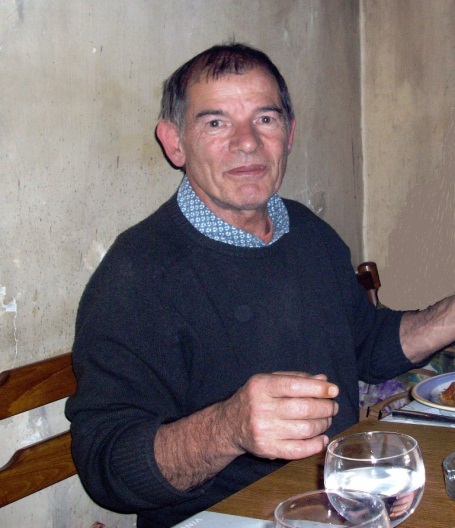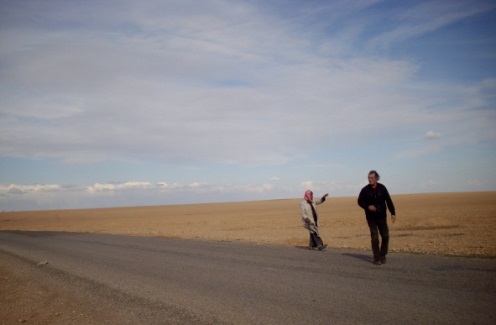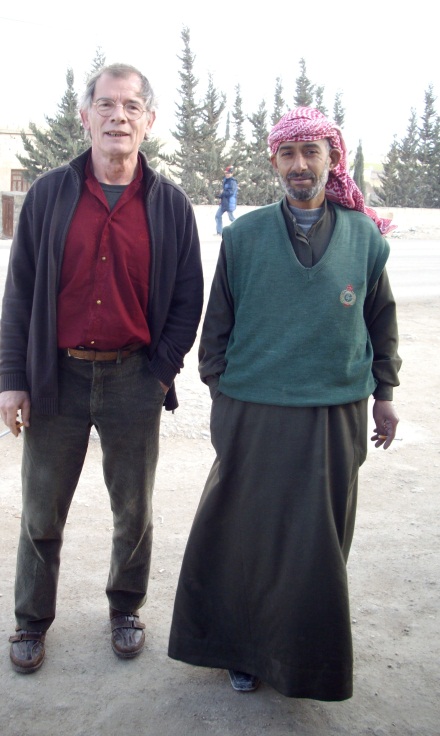|

|
|
Bernard De Monès
Writer and poet
|
Bernard, you have dedicated most of your life to experimenting with new languages and finding new ways of playing with words.
In 2009, you decided to quit France and go and live in Syria. Since then you have devoted yourself to reading and writing poetry. I’ve read your poetry and I find that there is a lot of irony in it. Your way of playing with words is intriguing. You are referring to typical French expressions as well as to onomatopoeic words invented by yourself.
Can we say that you are creating a new poetry style and inventing new forms of storytelling?
I wouldn’t talk about irony, but rather about humour. Many years ago, I started writing poems in which I played with words and used humour which I found very enjoyable. I was inspired by the “Oulipo French writers group”. (1)
Later on I started adding new elements to my poetry, such as emotions and music. I feel now that word musicality and word association is really what matters to me. It is not for nothing that people say that a poet “sings” the beauty of a woman or that a “troubadour” embodies passionate poets and musicians. Can we talk about a new style of poetry? I would say that every writer has his own way of doing poetry and the peculiarity of my style comes, certainly, from this way of playing with words, mingled with humour and music.
What importance do you give to the women described in your poetry? Are women your inspiration, your muses?
I like thinking that all women are muses. Where would we be, poor little men, without women? Women are also an important source of love, they love being loved. Love for life, love for the others and love for the world. All this “love” is the essence of a woman’s love, i.e. the love we give to a woman as well as the love a woman gives us. One day I saw a landscape made of smoothly rounded hills and I told myself: the earth is like a woman’s body!.
It would be interesting to know how female poets talk about love and about their beloved man. Men, on the contrary, are everything but muses, rather they are tactless!
Many of the women you describe in your poetry are “warrior women”, women who love fighting. Is this the kind of woman you like most?
Only occasionally I have met women who love fighting, especially in Syria where I came back for the second time and I remained three years. At the same time, I love women who have a certain character and a strong personality, surely not the docile or accommodating kind of women. Yet, this is not an easy thing and love is not a panacea for everything, rather a struggle and a way to achieve new things on a daily basis. Love is also made of ups and downs. Indeed the love you find in poetry talks about pleasure and suffering, passion and despair.
The most important thing is to maintain our own love for life and for our friends. Friendship in particular is one of the most important feelings you might have, a feeling that may last for a very long time.
Women are not an artistic creation for poets and not even for me. I wonder whether this means the same for painters, sculptors, filmmakers, publishers and serial writers.
 You lived some years in Syria and in 2012 you had to quit the country because of the revolution. You met a lot of friends there and you talked to many Syrians.
You lived some years in Syria and in 2012 you had to quit the country because of the revolution. You met a lot of friends there and you talked to many Syrians.
What is the condition of women in Syria? Can we speak of a typical model of woman or are there many different types of Syrian women?
I have had many contacts with Syrians and I had the opportunity to talk to many women friends. I used to meet them in cafés or restaurants in the old town of Damascus. Though it is difficult to establish real contacts with Syrians because of the many constraints linked to the traditional clan structure and to the very old and strong traditions, most of the women I met were living outside their families. These traditions are even stronger when it comes to relations between men and women. My women friends were all well-educated, as in the western style, and they had all studied and travelled outside Syria.
In Syria, women consider themselves, first of all as Syrian women, and only then as belonging to the Arab culture and civilization, at least this was how it was before the revolution. Apart from religion, Syrian women have shared the same traditions for 2000 years and we can find the same traditions in the whole Mediterranean area.
 Syria has been able to safeguard its cultural and religious diversity for many centuries. It is a real crossroads of cultures, religions and ethnic groups. A country when Muslim women have lived side-by-side with Christian women for a long time. How did you experience this coexistence?
Syria has been able to safeguard its cultural and religious diversity for many centuries. It is a real crossroads of cultures, religions and ethnic groups. A country when Muslim women have lived side-by-side with Christian women for a long time. How did you experience this coexistence?
An interesting element to point out is that people in Syria hardly speak about religion in their daily life. It is not a taboo or an interdiction, it is just like this and it is part of the traditional culture. People never ask other people what religion they belong to. Since people don’t talk about that, the coexistence between women from different religions doesn’t really cause any problem. When you meet somebody in Europe you never ask them what religion they belong to. So the same thing happens in Syria. Syrians first of all consider themselves to be Syrians, and then they are Arabs in that they are bound to the Arab culture, language and traditions.
Another thing is the interaction between women and men. To give you an example, when I was living in my house in Damascus and I would go on my terrace for one reason or another, all the women in the nearby houses that I could have seen by mistake, would hide themselves. In general, women are only allowed to go on the terraces of their houses to hang out the laundry. Another example is when I used to go and visit some of my friends, the men would gather in one room to discuss and drink tea, while the women stayed in another room or in the kitchen.
To go back to poetry, do you think that women have an important role in poetry or other literary genres?
Indeed, I believe that in general women play a very important role in literature. Women are important muses inspiring love. A writer needs special emotions to trigger his own inspiration, and who better than a woman who we love can give us this? We should go back to reading our old great poets, they have all written poems about love, they have all sung about the grace of women, their beauty, their charm. Every woman is a mystery that we try to understand, though without ever succeeding.
Can you tell us something about gender relations as seen through the eyes of a poet?
Adam and Eve must have asked themselves the same question about gender relations! Relations between women and men are just human relations. It is definitely better when they include a positive emotion and a bit of affection. Even when it is friendship, there is always a bit of love mingled with it.
But often when love comes into a relationship, passion and desire might baffle it. The problem today is that people are not able to take responsibilities and risks anymore. Most people are likely to start a love story only if they know in advance how they can come out of it. Eternal love, love that people promise to each other doesn’t exist anymore. Like in a consumer society, most people are likely to get rid of the “object” of their love and replace it with a “new one” when they split up and their love story is finished. This is not really a romantic epoch anymore!
In your poetry you are highlighting the dream dimension, and the “troubadour love”, but you also refer to real life. How do you define poetry today? What is the value of poetry in our society?
It is true that I write about traditional poetry, I don’t like contemporary poetry so much because I can hardly hear music in the words. I write mainly for myself and for the pleasure it gives me. But I also write for my friends, for family members or somebody I care about. Sometimes, I would like more people to read my poetry because this gives me the possibility to connect with them and share ideas. But being published on a larger scale is not my ultimate motivation.
Unfortunately, today poetry is less and less read and understood by people. Book stores don’t display so much poetry on their shelves because they say it doesn’t sell so much, and there is few television programs talking about poetry. Those people who are still fond of poetry, and do their best to promote the value of it, are unfortunately confined to a small circle of people.
Do you think there is a way to safeguard and revive poetry in our societies?
When I was a kid, and I was at school, we used to learn poetry by heart. Thanks to that, we learned to recognize the rhythm and musicality in the words and to write beautifully. At that time we used to learn poetry, literature and history altogether.
Now schools are mainly a place to learn a craft, a profession. Poetry is less likely to be taught in schools and young people have lost the pleasure of reading, and in many cases they read hardly any poetry. In the Middle East poetry has still great value; everybody is capable of saying and singing a poem just because they learn it at school. In the western culture, the entire education system should be changed, although this is unlikely to happen and we must remain realistic.
Who is Bernard De Monès in his everyday life? Are you the person who shows some features of your personality through your writing, essentially a person with great sense of humour, or are you somebody who takes life seriously?
Indeed, I am a person who uses a lot of humour. I never took life so seriously, I’ve always felt the need to escape when things would start getting serious.
At the time I was still working, I couldn’t help making a joke from time to time to improve the atmosphere between colleagues. This was a way to say that we are all serious but we should not forget that we just have one life and it is beautiful.
Later on, I made the decision to take some time and space for myself, and go to Damascus and live alone. In this way I thought I could enjoy my creativity and find more inspiration. But this only represents a part of my life. This feeling is not to be confused with solitude and isolation, the same feeling we frequently encounter in our societies where people often feel abandoned and don’t live happily alone nor with the others, a feeling often leading to depression. Unfortunately this phenomenon is growing.
The other part of my life is the one I like sharing with the others, with my friends - who I enjoy partying and drinking a glass of wine with. A true epicurean ideal!
How do you see the role of the women managers through the eyes of a poet?
With the coming of feminism many women have become more emancipated and a large number of them today occupy high-ranking positions in the professional sphere. Nothing wrong with that, but this doesn’t have to happen to the detriment of their femininity, as a result of having to bear the weight and pressure of a society which is still strongly permeated by machismo.
How do you see the evolution of women’s role in our societies?
This is a million-dollar question! Women do basically everything that men do except for work which demands high physical strength. It is necessary though that men and women remain complementary to each other, with their intrinsic qualities, in a perfect balance of sweetness and strength, sensitivity and love.
Which are the features that women should never lose?
The best answer is the text of Christian Bobin in “Le Très Bas”(2): "Les hommes ont peur des femmes. C'est une peur qui leur vient d'aussi loin que leur vie. (…) Qu'est-ce qu'une femme? Personne ne sait répondre à cette question, pas même Dieu qui pourtant les connaît pour avoir été engendré par elles, nourri par elles, bercé par elles, veillé et consolé par elles. (…) Les femmes sont la vie en tant que la vie est au plus près du rire de Dieu. Les femmes ont la vie en garde pendant l'absence de Dieu, elles ont en charge le sentiment limpide de la vie éphémère, la sensation de base de la vie éternelle. Et les hommes, ne pouvant dépasser leur crainte des femmes, croyant la dépasser dans des séductions, des guerres ou des travaux, mais ne la dépassant jamais réellement, les hommes, ayant une peur éternelle des femmes, se condamnent éternellement à ne presque rien goûter de la vie et de Dieu. Parce que ce sont les hommes qui font les Eglises, il est inévitable que les Eglises se méfient des femmes (…).
I believe that the difference between men and women is not always linked to gender but it is rather a difference of roles. A man cares about his role(s) within society. Women are often lost in the love they are eager to receive from others and they care less about social roles. Luckily gender differences can be surpassed. A man who is able to come out of his shell and overcome his fear of women is definitely able to break out of expected social role(s), and he is likely to not believe anymore in those roles, and in the hierarchies, established by law or custom, which inevitably forge gender differences.
REFERENCES
(1) Oulipo French writers group (Oulipo stands for Ouvroir de Litterature Potentielle)
(2) Christian Bobin: Le Très-Bas, Gallimard, 1992
Although the original version is in French we have provided an English version: “Men fear women. It is a fear which comes from as far as than their life (…). What is a woman? Nobody knows how to answer to this question, not even God who knows them very well because he was conceived by a woman, he was fed, nourished, cuddled, watched over and consoled by them (...). Women represent life which is very near to God’s laugh. Women take care of life during the absence of God, they have a vibrant feeling which recalls the ephemeral life, and the basic perception of the eternal life. And men, who cannot overcome their fear of women, while thinking to get over it through seduction, wars and many other activities, are still not able to fully overcome it. These men having an eternal fear of women, condemn themself to nearly know anything about women, nor enjoying any aspects of God and life. Indeed, it is men who build churches and it is inevitable that churches mistrust women (…)”.
.png)
.png)